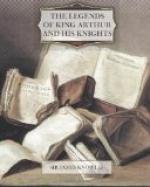The land of Britain being now in peace, and many great and valiant knights therein ready to take part in whatsoever battles or adventures might arise, King Arthur resolved to follow all his enemies to their own coasts. Anon he fitted out a great fleet, and sailing first to Ireland, in one battle he miserably routed the people of the country. The King of Ireland also he took prisoner, and forced all earls and barons to pay him homage.
Having conquered Ireland, he went next to Iceland and subdued it also, and the winter being then arrived, returned to Britain.
In the next year he set forth to Norway, whence many times the heathen had descended on the British coasts; for he was determined to give so terrible a lesson to those savages as should be told through all their tribes both far and near, and make his name fearful to them.
As soon as he was come, Riculf, the king, with all the power of that country, met and gave him battle; but, after mighty slaughter, the Britons had at length the advantage, and slew Riculf and a countless multitude besides.
Having thus defeated them, they set the cities on fire, dispersed the country people, and pursued the victory till they had reduced all Norway, as also Dacia, under the dominion of King Arthur.
Now, therefore, having thus chastised those pagans who so long had harassed Britain, and put his yoke upon them, he voyaged on to Gaul, being steadfastly set upon defeating the Roman governor of that province, and so beginning to make good the threats which he had sent the emperor by his ambassadors.
So soon as he was landed on the shores of Gaul, there came to him a countryman who told him of a fearful giant in the land of Brittany, who had slain, murdered, and devoured many people, and had lived for seven years upon young children only, “insomuch,” said the man, “that all the children of the country are destroyed; and but the other day he seized upon our duchess, as she rode out with her men, and took her away to his lodging in a cave of a mountain, and though five hundred people followed her, yet could they give her no help or rescue, but left her shrieking and crying lamentably in the giant’s hands; and, Lord, she is thy cousin Hoel’s wife, who is of thy near kindred; wherefore, as thou art a rightful king, have pity on this lady; and as thou art a valiant conqueror, avenge us and deliver us.”
“Alas!” said King Arthur, “this is a great mischief that ye tell of. I had rather than the best realm I have, that I had rescued that lady ere the giant laid his hand on her; but tell me now, good fellow, canst thou bring me where this giant haunteth?”
“Yea, Lord!” replied the man; “lo, yonder, where thou seest two great fires, there shall thou find him, and more treasure also than is in all Gaul besides.”
Then the king returned to his tent, and, calling Sir Key and Sir Bedwin, desired them to get horses ready for himself and them, for that after evensong he would ride a pilgrimage with them alone to St. Michael’s Mount. So in the evening they departed, and rode as fast as they could till they came near the mount, and there alighted; and the king commanded the two knights to await him at the hill foot, while he went up alone.




